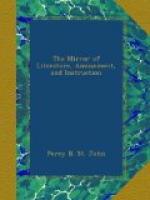To us the sight was curious; we had seen none lately but what were the reverse of carefully educated beings. But we had little time to think, for a laugh burst forth at their perceiving us, which naturally attracted the notice of the pedagogue, who took up his crutch to go and examine the cause, for he was a cripple. We immediately came forward to the only opening among the rich verdure, and meeting him, announced ourselves as the intruders. He was as much surprised as his pupils had been. His magisterial brow, for he was alcade as well as schoolmaster, relaxed into a civil smile. He invited us to walk in, and we accepted his invitation, and entertained ourselves with examining the progress made by his boys in their studies, and in replies to his numerous questions put respecting the battle of Ayacucho, the death of Olaneta, and the termination of the war in Peru. He asked if it was true, that the English were coming to settle in the country, with many similar questions. In answer to our inquiries about himself, he said he was born on the spot, lame as he was, and had never quitted it; he had given his mind to study, but his profession was (as it is everywhere else) “muy pobre;” that the price of a school education there, was from two to four rials a month, according to what the pupil was taught. Just at that moment a boy came up with a pen to be mended. To my surprise, he drew from his old pair of Spanish blues (open at the knees, with a silver buckle appended), what we denominate a Flemish or gardener’s knife, and proceeded, with the help of a pair of cracked spectacles, to nib the pen.
“What,” said I, “Viejo (old boy), have you no better instrument than that to work with?”
“Nada mas Senor, yo soy muy pobre Senor.” (Nothing more, sir, I am very poor.)
“Well,” I replied, “I think I can help you to something better than that for the convenience of your calling,” and I gave him an old four-bladed English knife, which I happened to have in my pocket at the time. On looking at it, he exclaimed in astonishment, “Que quatro cuchillos en uno!” (what, four blades in one knife!) Ha had never beheld such a machine in his life. I told him it was of English manufacture. “Caramba!” he replied, “los Ingleses son hombres muy habiles;” (the English are very clever.) I told him it was at his service. “Por nada,” (for nothing)




